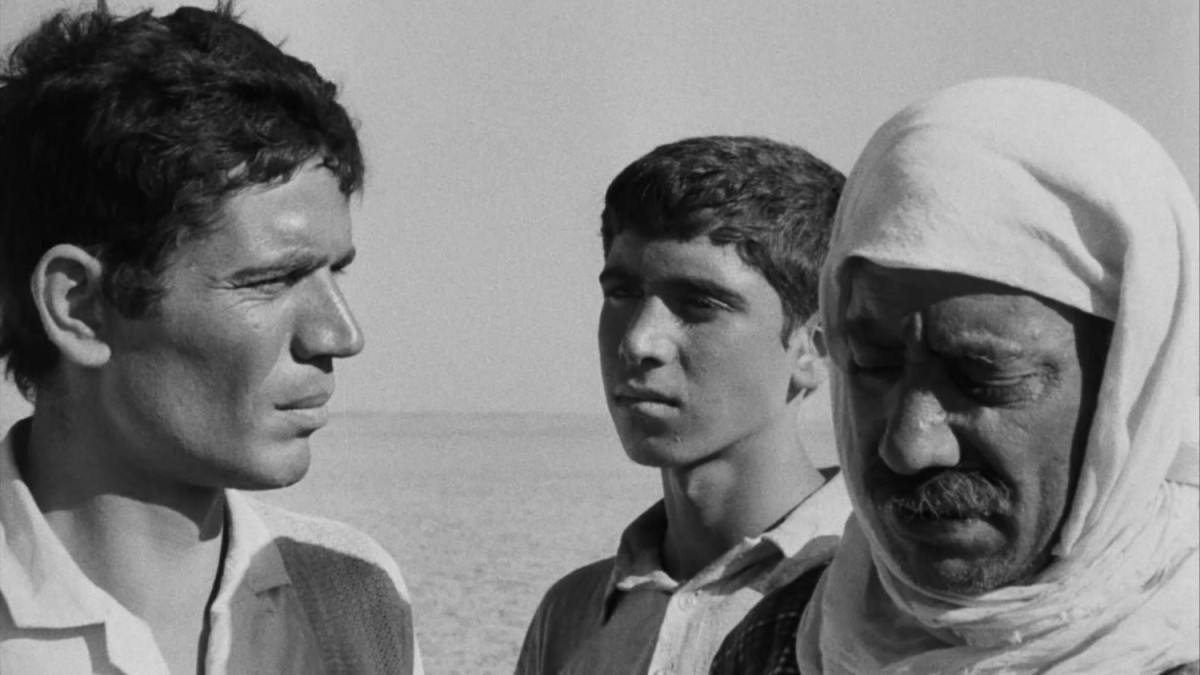A new digital restoration of the 1972 film “The Dupes,” directed by Tewfik Saleh, a leading social realist Egyptian filmmaker, will premiere today at Film at Lincoln Center as part of the 61st New York Film Festival’s revivals section. The film — based on the 1962 short story “Men in the Sun” by Palestinian writer and political activist Ghassan Kanafani — follows three Palestinian refugees in 1950s Iraq, each seeking work in Kuwait and navigating their individual identities after being dispossessed from their homes in 1948.
The refugees — the middle-aged Abou Kaiss (Mohamed Kheir-Halouani), the young Assad (Bassan Lofti Abou-Ghazala) and the adolescent Marwan (Saleh Kholoki) — evidently represent three different generations of Palestinians who were expelled from their villages after the establishment of the state of Israel. Saleh describes the post-1948 Palestinian experience through three distinct personalities of different ages and histories. Yet their seemingly separate backgrounds are collectively intertwined within the context of the Palestinian struggle in “The Dupes.”
Abou Kaiss is failing to provide for his wife and child after seeking refuge in Iraq. He dreams of one day making enough money to send his son to school and purchase olive trees for his family, but ultimately finds himself unemployed under the strenuous economic circumstances in the country. After a colleague betrays him, Assad, a political activist, is hunted by local authorities. In an effort to abide by societal norms, he eventually accepts a marriage settlement that he cannot afford. Marwan is a high school student whose older brother, the breadwinner of the house, stops sending money from Kuwait after getting married. After Marwan’s father marries a well-off woman — leaving him, his young siblings and his mother to fend for themselves — he is forced to leave school and search for work to provide for his family.
Though each protagonist comes from what appears to be different familial circumstances, all three refugees eventually come to the same conclusion: to travel to Kuwait for work. Poetically enough, they each also approach the same smuggler, Aboul Kheizaran (Abderrahman Alrahy), to sneak them across the Iraq-Kuwait border in his truck at a discounted price. The catch is that they would have to hide twice inside a water tank for six to seven minutes through border control in the scorching heat.
While “The Dupes” centers around a variety of themes such as dispossession, inequality and colonialism, the theme of masculinity is most prominent throughout the film. Each of the three protagonists is either innately compliant or forcing themselves to comply with societal expectations of them as men; the latter struggle is especially seen in Marwan’s character. As a 16-year-old boy, Marwan’s only initial concern was to do well in school and eventually have a life of his own. The misguided sense of pride and self-absorption of the men around him — whether it be his brother’s abandonment or his father’s decision to leave his family for financial comfort — forced Marwan to mature and reconsider his responsibilities as a teenager. Marwan’s story is just one of many examples Saleh uses to highlight this seminal theme.
Though the film was shot entirely in Syria, Saleh was an Egyptian filmmaker who helped pioneer the country’s social realism film movement during the 1970s. The movement mainly focused on depicting socialist themes in a positive light, often involving narratives that focused on the nation’s need to catch up to Western standards of modernity or progress. However, “The Dupes” deviates from this style by showcasing socialist ideals — primarily the need for socioeconomic equity. Through its staggeringly authentic performances and naturalistic visual demeanor, Saleh communicates this message in an incredibly human, non-pandering way.
The film’s realism is attributed to its largely unpolished and gritty cinematography, which captures the protagonists’ facial expressions and introspection with great detail. “The Dupes” breaks boundaries by defying the traditional commercial narrative. This is most prominent in the film’s use of non-professional actors, a trend introduced by the Italian neorealism film movement in the 1940s. This deliberate choice to cast ordinary people in the film elevates its universality and dedication to depicting the everyday life of the lower class, emphasized by the heavy, haunting musical score that is oftentimes reminiscent of an excruciatingly slow, looming heartbeat.
Unconventionally structured and unapologetically told, “The Dupes” delivers a powerful piece on ambition and identity. It is one of the few Arab films to directly address the Palestinian struggle in a fashion that isn’t solely political, but rather surprisingly and remarkably human. Saleh does not detail any tangible Israeli presence in this story, stressing the implicit effect of Israel’s establishment on the lives of Palestinians — an effect that is still present today. “The Dupes” only elevates Kanafani’s source material cinematically, and hauntingly so, cementing itself as one of the finest films to ever come out of the Middle East.
“The Dupes” will screen at the New York Film Festival on Oct. 6, Oct. 9 and Oct. 10.
Contact Yezen Saadah at [email protected].






















































































































































